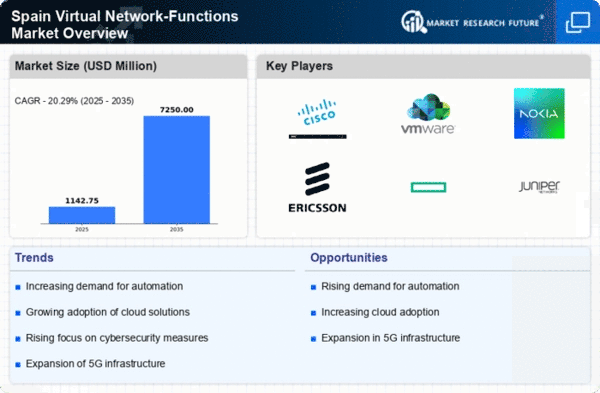Emergence of 5G Technology
The rollout of 5G technology in Spain is set to revolutionize the virtual network-functions market. With its promise of ultra-fast connectivity and low latency, 5G enables new applications and services that require robust network capabilities. This technological advancement is expected to create new opportunities for virtual network functions, as businesses look to leverage 5G for enhanced performance. Analysts predict that the adoption of 5G will lead to a substantial increase in demand for virtualized network solutions, potentially boosting the market by over 20% in the coming years. The synergy between 5G and virtual network functions could redefine how organizations approach network architecture.
Rising Demand for Network Flexibility
The virtual network-functions market in Spain is experiencing a notable surge in demand for network flexibility. Organizations are increasingly seeking solutions that allow for rapid deployment and scalability of network services. This shift is driven by the need to adapt to changing business environments and customer requirements. According to recent data, the market is projected to grow at a CAGR of approximately 15% over the next five years. This growth indicates a strong inclination towards adopting virtualized solutions that enhance operational efficiency. As businesses strive to remain competitive, the ability to quickly adjust network resources becomes paramount, thereby propelling the virtual network-functions market forward.
Growing Focus on Digital Transformation
Digital transformation initiatives are driving the virtual network-functions market in Spain. As organizations increasingly embrace digital technologies, the need for agile and scalable network solutions becomes evident. Businesses are investing in virtual network functions to support their digital strategies, enabling them to enhance customer experiences and streamline operations. Recent studies indicate that nearly 70% of companies in Spain are prioritizing digital transformation, which directly correlates with the growth of the virtual network-functions market. This trend suggests a robust future for virtualized solutions as they become integral to the overall digital landscape.
Cost Efficiency and Resource Optimization
Cost efficiency remains a critical driver for the virtual network-functions market in Spain. Enterprises are increasingly recognizing the financial benefits associated with virtualized network solutions. By reducing the reliance on physical hardware, organizations can significantly lower capital expenditures and operational costs. Reports suggest that companies can achieve savings of up to 30% by transitioning to virtual network functions. This financial incentive is compelling, especially for small and medium-sized enterprises (SMEs) that operate with limited budgets. As a result, the virtual network-functions market is likely to see heightened interest from various sectors aiming to optimize resource allocation while maintaining service quality.
Regulatory Compliance and Data Sovereignty
In Spain, regulatory compliance and data sovereignty are becoming increasingly important for businesses, influencing the virtual network-functions market. Organizations must adhere to stringent data protection regulations, such as the General Data Protection Regulation (GDPR). This compliance necessitates the implementation of secure and efficient network solutions that can manage data locally. The virtual network-functions market is poised to benefit from this trend, as companies seek to deploy solutions that ensure data remains within national borders while still providing the flexibility of virtualized services. This focus on compliance is likely to drive innovation and investment in the market.
















